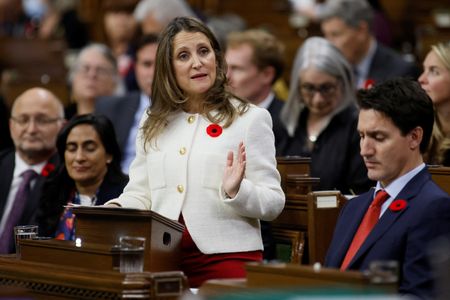 1
1 1
1

By Steve Scherer
OTTAWA (Reuters) -Canada’s budget will introduce a system to lock in future carbon credit prices, a move meant to boost investments by giving businesses certainty to develop low-carbon technologies, a senior government source with knowledge of the document told Reuters on Monday.
So-called contracts for difference set a price on tradable carbon credits, which heavy emitters can get if they reduce pollution. If the market price for the credit falls below the minimum in the contract, the government would make up the difference.
Canada’s system will be run through a growth fund announced in last year’s budget, which will be operational “in the coming months” and will be “particularly focused on large projects,” said the source, who was not authorized to speak on the record.
The Ministry of Finance declined to comment on the contents of the budget. The government is also looking at how it could “potentially” offer contracts for difference “at a slightly smaller scale”, the source said without providing details.
Some heavy emitters such as oil sands producers say lack of pricing certainty has held them back from making significant investments in emission reduction projects like carbon capture and storage. They are also concerned that costly projects could be a waste of money if carbon pricing is scrapped in future.
Finance Minister Chrystia Freeland will present the 2023-2024 budget bill to parliament on Tuesday. Contracts for differences could be used by companies investing in carbon capture or hydrogen projects, the source said.
“People are talking about large capital investments in this net-zero transition. This is just giving businesses some certainty, particularly over the longer term,” the source said.
Under Canada’s carbon pricing rules, large industrial polluters pay per tonne of carbon emitted above a certain sector-specific threshold. Polluters can also generate credits by cutting emissions and then sell the credits, which has raised concerns that cheap credits will flood carbon markets in coming years as more large emissions-reduction projects start operating.
“Contracts for difference that provide confidence in credit values is a key missing ingredient to unlock large investments in a range of clean technologies,” said Michael Bernstein, executive director at Clean Prosperity Executive, a clean-tech advocate.
“It’s also a smart way for Canada to keep pace with the United States in attracting new clean energy projects and jobs, without breaking the bank,” Bernstein said.
Freeland has said there will be major investments in this year’s budget because Canada is at a “crucial crossroads”. But she has also said she does not want to fuel inflation and that now is a time for fiscal responsibility.
“Composition of spending matters,” the source said, saying investments to boost economic capacity would not be inflationary. Clean-tech investments “are also about enhancing the long-term productive capacity of the Canadian economy” and are “interpreted differently”.
LEVELING THE FIELD
Countries across the globe want to take advantage of a rapid shift to low-carbon energy, and Canada is seeking to level the playing field with the United States, which passed massive incentives in its Inflation Reduction Act (IRA) last year.
Alongside contracts for differences, Canada plans a 30% investment tax credit to boost clean-tech manufacturing, especially in the electric vehicle (EV) supply chain, two sources told Reuters last week.
Canada has limited financial firepower compared with what the United States put forward in the IRA, which many experts say will lead to more than $1 trillion in investment.
Other budget investments will be focused on increasing the capacity of the electricity grid, on battery manufacturing and on mass timber construction, a source told Reuters earlier this month.
Canada will spend more than C$2 billion ($1.5 billion) on a rebate aimed at helping low-income families bear the brunt of high inflation, the Canadian Broadcasting Corp reported on Monday citing a source.
A similar measure was introduced in the fall in the form of a sales-tax rebate. It will benefit 11 million households, the source told CBC, who called the measure a “grocery rebate”.
CBC also confirmed an earlier Canadian Press story saying the budget would include a crackdown on hidden or unexpected charges – so-called junk fees – that could affect telephone or internet providers or ticket sellers.
($1 = 1.3688 Canadian dollars)
(Reporting by Steve Scherer; Editing by Denny Thomas and Andrea Ricci)